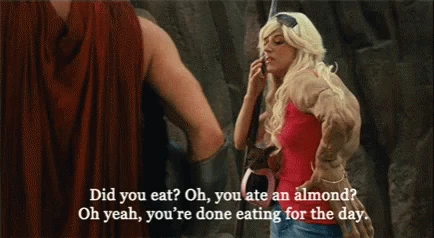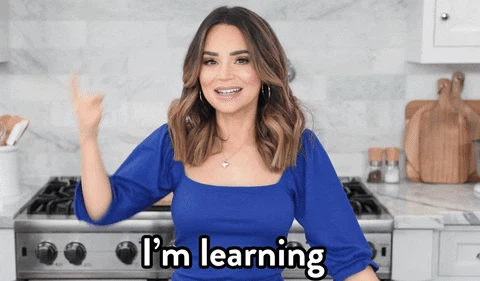What Is An Almond Mom? Plus 11 Tips To Cope If You Grew Up With One
Moms have an uncanny ability to have their words stick with us for years to come.

As much as we love moms, the reality is that none of them were perfect, even if they gave motherhood their best effort. You’d be hard-pressed to find anyone whose mom never did or said anything that hurt their feelings, made them insecure, or promoted an unhealthy habit. After all, no matter how many kids they have, moms continue to learn on the job for the rest of their lives.
Maybe your mom once made an offhand comment about your hair that took years for you to forgive her for, or maybe she said something about your fashion sense that continues to ring in your head, or maybe she was (and still is) an almond mom who always has something to say about your portion at dinner. Wait: What’s an almond mom, anyway?

What Is an Almond Mom?
The trending TikTok term first came about because of a viral clip from The Real Housewives of Beverly Hills, featuring model Gigi Hadid and her mom, Yolanda.
“I’m feeling really weak. I had, like, half an almond,” Gigi sighs, sounding a bit shaky.
“Have a couple of almonds, and chew them really well,” her mother replies.
At that point, the term “almond mom” was born. And like many things on TikTok, it didn’t take long for floods of young women to come forward, talking about what it was like to grow up with an “almond mom” – a mother who often espoused diet-culture advice; instilled in her daughters an unhealthy relationship with food; counted every single calorie; often said something along the lines of “Are you sure you want to eat that? Why don’t you drink some water instead?”; and would swear by snacking on a handful of almonds to stave off hunger (rather than, say, eating a nutritious meal).

How Diet Culture Created Almond Moms
Millennial women and many Gen Z girls have been exposed to diet culture for the better portion of their lives. Growing up in the '90s and 2000s, we were confronted with thinspirational quotes like, “Nothing tastes as good as skinny feels.” We regularly saw tabloid magazines with headlines that picked apart female celebrities’ “beach bodies” and touted all kinds of harmful “weight loss secrets” that glorified one very particular body type.

The pressure to have minimal body fat, even by means of heavily restricting our food intake, was very real. Many women in this age bracket felt that pressure from their almond moms as well as from culture, so it’s unsurprising that eating disorder rates rose from 2000 to 2018.
How To Cope If You Had an Almond Mom
It’s safe to say that if you’re a Millennial or elder Gen Z and you had an almond mom, then you’re still trying to work on your relationship with food and your body – and that’s a rough, winding, long road to navigate. There are countless habits to unlearn, phrases to banish from your inner monologue, and new patterns to pick up.

Here are a few ways to recover if you had an almond mom:
First, give her context. She likely has food and body image issues herself, and thinks she’s helping you.
Tell her how you feel while offering her the benefit of the doubt. (“I know you’re trying to help, but it really hurts my feelings when you say that.”)
Draw boundaries. Let her know that you don’t feel comfortable discussing the subject at hand. (“I’d rather not talk about this.”)
Be ready to walk away from the situation if she doesn’t listen.
See yourself as someone who deserves to love their body and enjoy food.
Cultivate a healthy relationship with food. Eat healthy, satisfying meals rather than restricting calories or loading up on junk food.
Learn how to treat your body well; exercise regularly and give your body the nourishment it needs.
Learn how to dress for your unique body type instead of fighting against it.
Don’t hold yourself to such strict meal plans that if you have a single cookie on the weekend, it sends you down a spiral.
Read up on nutrition and learn the difference between healthy and unhealthy foods. Make food something you understand rather than a mysterious enemy.
If you need someone to work through your food and body issues with, seek professional counseling and speak to trusted friends.
Closing Thoughts
If you had (and maybe still have) an almond mom, chances are, you didn’t grow up with the healthiest attitude towards food and your body. Even if your mom was just repeating what she’d come to believe and thought she was helping you, there’s a lot to undo — and a lot to learn when you’re trying to heal from the remnants of diet culture. That being said, it is possible to give yourself the good relationship with food and your body that you've always deserved.
Love Evie? Sign up for our newsletter and get curated content weekly!